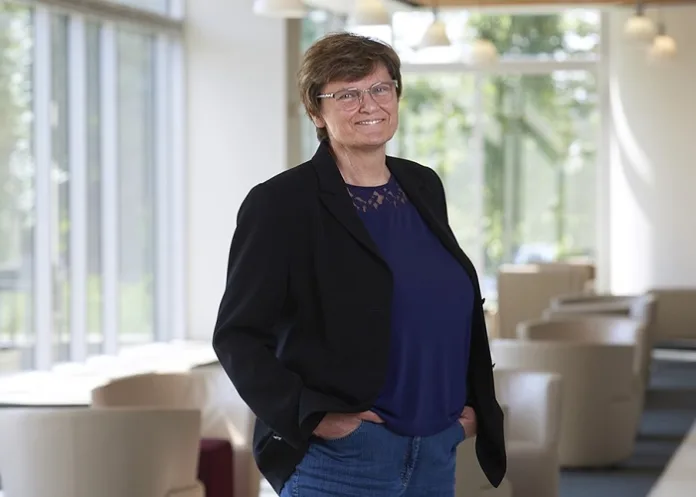Katalin Karikó, who is sharing with Drew Weissman the Nobel Prize in medicine for her work with mRNA vaccines, was previously demoted by the University of Pennsylvania for her research in that area, with the organisation saying it was not “faculty quality”.
“I was kicked out from UPenn, was forced to retire,” Karikó told the Nobel Prize organisation last week.
The work in their prize-winning area has not been an easy road for Karikó, who had to fight her whole career to study mRNA vaccines, reports The Hill.
In 1995, UPenn demoted her because she could not get the financial support to continue her research.
However, the university is still celebrating the winners’ award, issuing a congratulatory statement with no mention of the demotion or her rocky history with the institute.
“The University of Pennsylvania messenger RNA pioneers, whose years of scientific partnership unlocked an understanding of how to modify mRNA to make it an effective therapeutic … have been named winners of the 2023 Nobel Prize in Physiology or Medicine,” UPenn said.
“…Our Penn community is enormously proud of their ground-breaking achievements and this well-deserved recognition.”
Karikó left the university in 2013 to pursue an opportunity as the vice-president at BioNTech RNA Pharmaceuticals.
Backlash
According to a report from Forbes, the post from the university has angered the medical community.
Karikó was hired by UPenn in 1989 as an adjunct professor and researcher, where she met and began collaborating with Weissman, a professor of medicine at Penn, in 1997.
Though initially on track to become a tenured professor, the university reportedly offered Karikó a choice to either leave or be demoted with a pay cut in 1995 – which she said was “particularly horrible” because she had just been diagnosed with cancer and her husband was stuck in Hungary, thanks to a visa issue – telling her that her mRNA research was deemed too risky and did not attract enough grant funding.
Karikó took the demotion and continued her work, but later left her senior research investigator position (where she retains an adjunct professorship) in 2013 to serve as vice president at BioNTech.
Eric Feigl-Ding, chief of the Covid Task Force at the New England Complex Systems Institute and former Harvard Medical School researcher, urged Penn to apologise to Karikó but praised her for persisting in her research despite being demoted.
Nicole Paulk, founder of Siren Biotechnology, also criticised Penn Medicine for its post congratulating Karikó, stating: “You shunned her and put roadblocks in the way of her and her research when she was at Penn. You should feel immense shame, not pride, today. You played no role in this.”
Chance collaboration
Karikó and Weissman reportedly met in 1997 because they kept “fighting over a photocopy machine”, prompting them to talk and compare what they were working on.
Weissman reportedly had the funding to finance their mRNA experiments, which Karikó said kept her going.
Karikó, who long struggled to secure grant funding, apparently never earned more than $60 000 a year while at Penn.
After nearly a decade of partnership, Karikó and Weissman published findings in 2005 that showed how a modified version of mRNA could be administered without triggering an aggressive immune response, leading them to realise mRNA could potentially be used in vaccines.
Their research initially attracted little interest, and they founded a start-up but struggled to find investors.
They eventually licensed their technology to BioNTech, then a little-known company, where Karikó moved in 2013 after realising she would not make progress with mRNA research while still at Penn.
Their findings became the foundation for both the Pfizer/BioNTech and Moderna Covid-19 vaccines.
Karikó and Weissman have won numerous other accolades for their mRNA research, like the Breakthrough Prize in Life Sciences, Dr Paul Janssen Award for Biomedical Research and the Lasker Award.
Looking back
Karikó said in 2020 that her demotion at Penn made her feel that she was “not good enough, not smart enough”.
When the university refused to reinstate her to a tenure track position in 2013 and she left for BioNTech, Karikó said, “they laughed at me and said, ‘BioNTech doesn’t even have a website’”.
Surprising fact
While a researcher at Temple University in the late 1980s, Karikó – a native of Hungary – reportedly argued with her boss, who then attempted to have her deported.
Karikó had immigrated to the United States in 1985 with little money – she smuggled $900, which she earned by selling her car on the black market, into the country by sewing it into her daughter’s Teddy bear.
See more from MedicalBrief archives:
Nobel Prize goes to duo for Covid mRNA jab technology
How close are scientists in developing an mRNA cancer vaccine?
BioNTech: Project to develop mRNA-based vaccine against malaria with Africa production

